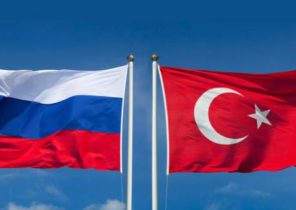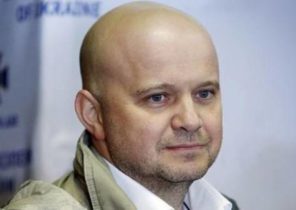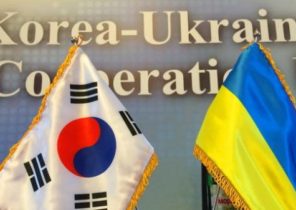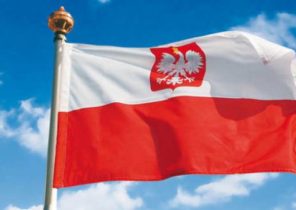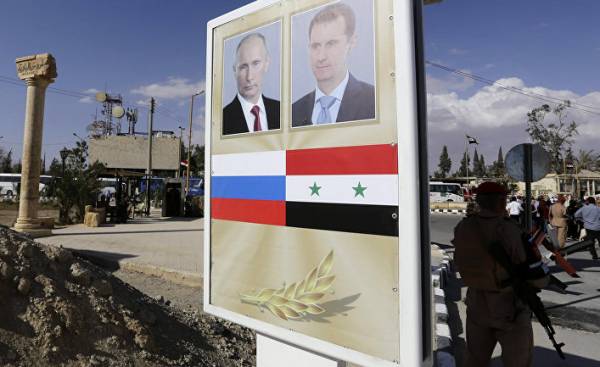
Of the many different reactions to the rocket attack of the USA against the army of the regime of Syrian dictator Bashar al-Assad the most attention of the foreign observers was attracted by Russia’s reaction.
Simply put, except for the Syrians, Syria has for the Kremlin, a higher value than for anyone else.
“Russia cannot allow anything that is able to reduce its status in Syria and in the region,” said Michael bell (Michael Bell), a former canadian Ambassador to Jordan and Israel and now a Professor of political science at the University of Windsor.
While U.S. officials have discussed the prospects for the renewal of economic sanctions and speculated about possible Russian involvement in chemical attack against Syrian civilians, the Russian missile frigate “Admiral Grigorovich” on Saturday, April 8, entered the Mediterranean sea in what Russian state media called a routine move.
Says Elliot Tepper (Tepper Elliot), honorary Professor, School of international relations named Norman Patterson at Carleton University, “the Russians want to make decisions, and, from their point of view, they will make decisions… Now we are faced with the possibility — I stress probability, that Russia can go on the escalation of the conflict”.
Why Syria is so important for the President of Russia Vladimir Putin?
Internal politics in Russia
Policy of any country always revolve around its people, and the popularity of Mr. Putin in Russia is one of the goals of the political doctrine, which partly took advantage of Mr. trump: again make Russia great.
Russia’s economy suffered greatly as a result of the fall in world oil prices. Now Russia is again gaining strength of the protest movement.
Demonstration of military power of Russia can to a certain extent, to calm the dissatisfied population, what Mr. Putin has seen in the course of their campaigns in Ukraine and in other countries.
“It is obvious that the role of the activist, which Putin plays in the middle East, brings him favor in the political arena,” says Mr. bell.
Also, for anybody not a secret that Mr. Putin and his intelligence services look for opportunities to limit the influence of the United States and weaken NATO.
For obvious reasons, Mr. Putin considers Syria a suitable place to check the levels of commitment of the West, because the last time this happened, the West did not meet expectations.
Power politics in the middle East
This is a very complex region of the world, and Syria is the most complex country in the region: it is home to many different tribes and religious groups.
After Syria became a failed state, in large parts of the country has created a power vacuum that is often filled by the militants of Islamic state (a terrorist group banned in Russia — approx. ed.) and its allies.
Another vacuum, formed largely because of the reluctance of the US to intervene in the Syrian conflict in 2013, under President Barack Obama, was quickly filled by Russia.
Now Russia is the main driving force in the region. Its influence, however, not forever.
“Even if the U.S. reacted too emotionally, this does not detract from the implications of what just happened, says Mr. bell. — It will force other countries to overcome the remaining after Obama’s reluctance to intervene.”
As part of wider sectarian conflict in the Islamic world, conflict between Sunnis and Shiites, Russia found a common language with Iran, the most powerful Shiite country in the region since the 1980s years. In the Syrian civil war are mostly Sunni rebels oppose a friendly Shia regime.
In the Muslim world and in Syria the Sunnis vastly outnumber the Shia and the Assad regime is part of the “axis of resistance”, which also includes the Shiite leaders of Iran, Iraq and the Lebanese extremist group Hezbollah. On the other side are Saudi Arabia, Egypt and their allies.
“What began as a revolt against the dictator in the framework of the Arab spring turned into a civil war that turned into indirect conflict between Sunnis and Shiites, and which now interfered with by the big powers,” said Mr. Tepper.
He continued: “what is Happening is crucial. We are witnessing the phenomenal collapse of the system of nation States established after the First world war in the middle East”.
Location
The geography of Syria is of great importance.
Military base in the port city of Tartus, created during the cold war provides Russia access to the Mediterranean sea, which is extremely important for commercial and military point of view.
Earlier this year, Mr. Assad signed agreement according to which the base of the Russian fleet in Tartus will be expanded and modernized so they could accommodate large ships, including aircraft carriers.
Near the city of Latakia, Russia has a military air base, which in 2015 was built from scratch and which is now about a thousand Russian military.
Syria provides Iran its only gateway to the Mediterranean sea.
The importance of natural gas
Pipelines are also an important factor in Syria.
The largest natural gas field under the Persian Gulf, and it is divided between Iran and Qatar, which has established close relations with the European Union.
Qatar, Saudi Arabia and Turkey want to build a pipeline, but it must pass through Syria.
Mr. Assad and his Iranian and Russian allies offer their own version of the pipeline route.
Given the fact that in six years of civil war, the Syrian economy had nothing left, production of energy seems a very attractive option for those who want to rebuild the country.
Two weeks ago Russia and Iran have held high-level talks on the issue of strengthening ties in the energy field.
As noted by the expert on the Middle East Dakar Milad (Milad Jokar) in his recently published article, “the needs of Europe in Gaza is very high, and a quarter of that gas comes from Russia.”
Needless to say that the Russian gas giant “Gazprom” is closely connected with Mr. Putin.
In political and economic terms, Russia is interested to maintain the status quo, that is, the regime of its ally, Mr. Assad, who belongs to the Alawite sect, and which remained in power largely through the support of the Christian and Druze minorities.
“Russia supports not so much the family of Mr. Assad, such as the type of regime — said Mr. bell. — Russia can not prevent the fall of the regime, but she also doesn’t want to confront the Americans.”
The next step of Russia
According to Mr. bell, the main question for Russia now is to determine in what circumstances the United States may again be tempted to intervene.
The unpredictability of the administration of the trump seriously complicates the situation. If this is an isolated move? Is it a change in policy or just in a relationship?
In any case, Syria remains a very complex puzzle that is very difficult to decipher, guided only by Western attitudes.
“It is similar to a dense network, which is impossible to untangle, adds Mr. bell. And the farther, the more the network gets confused”.
